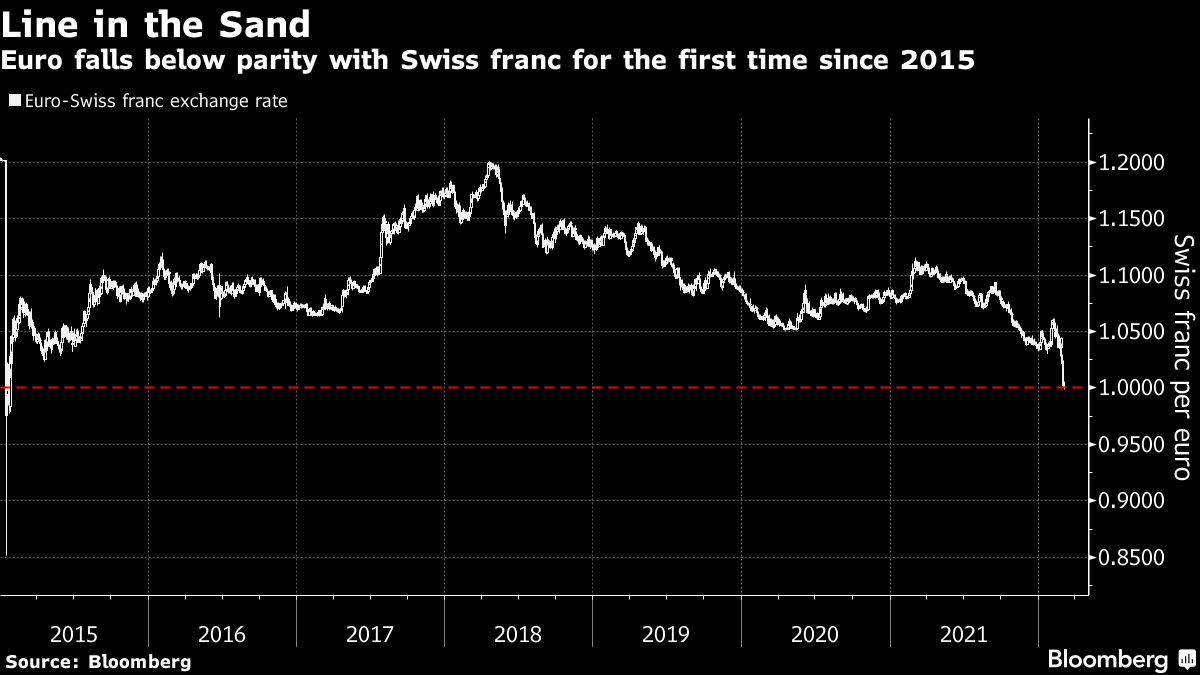European Currencies Crumble, Havens Soar on Oil-Price Shock

(Bloomberg) — European currencies plunged to new lows amid fears of a major inflationary shock to the global economy, with traders turning to traditional havens such as the Swiss franc and the U.S. dollar as the war in Ukraine escalated.
Most Read from Bloomberg
The euro fell below parity against the Swiss franc for the first time since January 2015, prompting the Swiss National Bank to reiterate its willingness to intervene on Monday. The pound fell to its weakest versus the dollar since December 2020, with investors fleeing to safety as concerns mount about the European growth outlook.
Among emerging-market currencies, Poland’s zloty and Hungary’s forint dropped to record lows against the euro. Brent crude briefly rose past $139 a barrel in London while price of natural gas soared on Monday after Bloomberg News reported the U.S. is considering whether to prohibit Russian oil imports.
“The economic fog in Europe is thicker given the region’s links with Russian energy,” said Jane Foley, head of G-10 FX strategy at Rabobank, who cut her one-month forecast for the euro-dollar pair to 1.06. “At the same time, the USD’s dominance in the global payments system ensures that it will remain in demand along with currencies of commodity producing countries.”
European currencies have borne the brunt of losses after Russia invaded Ukraine, with deep uncertainty over the evolution of the conflict as well as how sanctions will dampen growth in their economies. The euro, the second-most traded currency in the world and one of the “most liquid shorts” in Europe, slid about 5% in the past month.
The Biden administration is considering whether to prohibit Russian oil imports into the U.S. without the participation of allies in Europe, according to two people familiar with the matter. So far, Russia’s oil and gas have been moslty spared from sanctions due to concern over the economic impact. A bond market gauge of inflation expectations in Germany over the next decade jumped to a record high after the news.
Read More: Euro Risks Slide to Parity as Ukraine War’s ‘Most Liquid Short’
The euro dropped as much as 1.1% to 1.0806, while the pound dropped as much as 0.7% to 1.3142. The common currency traded as low as 0.9972 against the Swiss franc.
Sterling “is also being dragged down by European risks,” said Stuart Bennett head of G-10 FX strategy at Santander, adding that the market may be “reluctant” to pull the euro-sterling pair to below 0.82. That creates “less room for sterling to outperform the euro.”
Options show that traders are at their most bearish since 2011 on the common currency versus the dollar over a three-month period.
Market Interventions
The European Union’s eastern nations are stepping up market interventions to protect their currencies from the selloff. The Czech central bank sold foreign currency on Friday, joining the monetary authority in Poland, which intervened for the third time last week.
The Swiss National Bank said it was “still ready to intervene in the foreign exchange market if necessary,” in a written statement on Monday, noting that the franc’s appreciation reflected its role as a “safe haven currency” as well as inflation differences between Switzerland and other countries.
The SNB “have clearly been more tolerant of CHF strength in the last year or so, but there will inevitably be limits to how much strength they will continue to tolerate,” said Ray Attrill, strategist at National Australia Bank Ltd.
(Updates throughout.)
Most Read from Bloomberg Businessweek
©2022 Bloomberg L.P.




